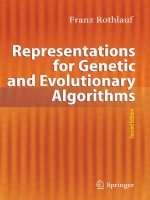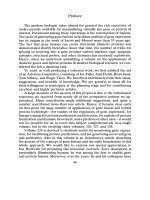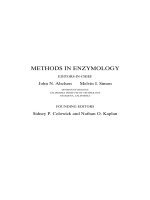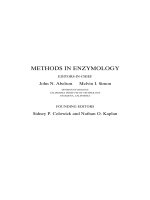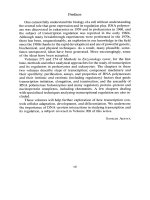genetic and evolutionary computation, part i
Bạn đang xem bản rút gọn của tài liệu. Xem và tải ngay bản đầy đủ của tài liệu tại đây (23.99 MB, 1,281 trang )
Lecture Notes in Computer Science 2723
Edited by G. Goos, J. Hartmanis, and J. van Leeuwen
3
Berlin
Heidelberg
New York
Hong Kong
London
Milan
Paris
Tokyo
Erick Cant´u-Paz James A. Foster
Kalyanmoy Deb Lawrence David Davis
Rajkumar Roy Una-May O’Reilly
Hans-Georg Beyer Russell Standish
Graham Kendall Stewart Wilson
Mark Harman Joachim Wegener
Dipankar Dasgupta Mitch A. Potter
Alan C. Schultz Kathryn A. Dowsland
Natasha Jonoska Julian Miller (Eds.)
Genetic and
Evolutionary Computation –
GECCO 2003
Genetic and Evolutionary Computation Conference
Chicago, IL, USA, July 12-16, 2003
Proceedings, Part I
13
Series Editors
Gerhard Goos, Karlsruhe University, Germany
Juris Hartmanis, Cornell University, NY, USA
Jan van Leeuwen, Utrecht University, The Netherlands
Main Editor
Erick Cant´u-Paz
Center for Applied Scientific Computing (CASC)
Lawrence Livermore National Laboratory
7000 East Avenue, L-561, Livermore, CA 94550, USA
E-mail:
Cataloging-in-Publication Data applied for
A catalog record for this book is available from the Library of Congress
Bibliographic information published by Die Deutsche Bibliothek
Die Deutsche Bibliothek lists this publication in the Deutsche Nationalbibliografie;
detailed bibliographic data is available in the Internet at <>.
CR Subject Classification (1998): F.1-2, D.1.3, C.1.2, I.2.6, I.2.8, I.2.11, J.3
ISSN 0302-9743
ISBN 3-540-40602-6 Springer-Verlag Berlin Heidelberg NewYork
This work is subject to copyright. All rights are reserved, whether the whole or part of the material is
concerned, specifically the rights of translation, reprinting, re-use of illustrations, recitation, broadcasting,
reproduction on microfilms or in any other way, and storage in data banks. Duplication of this publication
or parts thereof is permitted only under the provisions of the German Copyright Law of September 9, 1965,
in its current version, and permission for use must always be obtained from Springer-Verlag. Violations are
liable for prosecution under the German Copyright Law.
Springer-Verlag Berlin Heidelberg New York
a member of BertelsmannSpringer Science+Business Media GmbH
© Springer-Verlag Berlin Heidelberg 2003
Printed in Germany
Typesetting: Camera-ready by author, data conversion by PTP Berlin GmbH
Printed on acid-free paper SPIN 10928998 06/3142 543210
Preface
These proceedings contain the papers presented at the 5th Annual Genetic and
Evolutionary Computation Conference (GECCO 2003). The conference was held
in Chicago, USA, July 12–16, 2003.
A total of 417 papers were submitted to GECCO 2003. After a rigorous
doubleblind reviewing process, 194 papers were accepted for full publication and
oral presentation at the conference, resulting in an acceptance rate of 46.5%.
An additional 92 submissions were accepted as posters with two-page extended
abstracts included in these proceedings.
This edition of GECCO was the union of the 8th Annual Genetic Program-
ming Conference (which has met annually since 1996) and the 12th International
Conference on Genetic Algorithms (which, with its first meeting in 1985, is the
longest running conference in the field). Since 1999, these conferences have mer-
ged to produce a single large meeting that welcomes an increasingly wide array
of topics related to genetic and evolutionary computation.
Possibly the most visible innovation in GECCO 2003 was the publication of
the proceedings with Springer-Verlag as part of their Lecture Notes in Computer
Science series. This will make the proceedings available in many libraries as well
as online, widening the dissemination of the research presented at the conference.
Other innovations included a new track on Coevolution and Artificial Immune
Systems and the expansion of the DNA and Molecular Computing track to
include quantum computation.
In addition to the presentation of the papers contained in these proceedings,
the conference included 13 workshops, 32 tutorials by leading specialists, and
presentation of late-breaking papers.
GECCO is sponsored by the International Society for Genetic and Evolutio-
nary Computation (ISGEC). The ISGEC by-laws contain explicit guidance on
the organization of the conference, including the following principles:
(i) GECCO should be a broad-based conference encompassing the whole field
of genetic and evolutionary computation.
(ii) Papers will be published and presented as part of the main conference
proceedings only after being peer-reviewed. No invited papers shall be published
(except for those of up to three invited plenary speakers).
(iii) The peer-review process shall be conducted consistently with the prin-
ciple of division of powers performed by a multiplicity of independent program
committees, each with expertise in the area of the paper being reviewed.
(iv) The determination of the policy for the peer-review process for each of
the conference’s independent program committees and the reviewing of papers
for each program committee shall be performed by persons who occupy their
positions by virtue of meeting objective and explicitly stated qualifications based
on their previous research activity.
VIII Preface
(v) Emerging areas within the field of genetic and evolutionary computation
shall be actively encouraged and incorporated in the activities of the conference
by providing a semiautomatic method for their inclusion (with some procedural
flexibility extended to such emerging new areas).
(vi) The percentage of submitted papers that are accepted as regular full-
length papers (i.e., not posters) shall not exceed 50%.
These principles help ensure that GECCO maintains high quality across the
diverse range of topics it includes.
Besides sponsoring the conference, ISGEC supports the field in other ways.
ISGEC sponsors the biennial Foundations of Genetic Algorithms workshop on
theoretical aspects of all evolutionary algorithms. The journals Evolutionary
Computation and Genetic Programming and Evolvable Machines are also sup-
ported by ISGEC. All ISGEC members (including students) receive subscriptions
to these journals as part of their membership. ISGEC membership also includes
discounts on GECCO and FOGA registration rates as well as discounts on other
journals. More details on ISGEC can be found online at .
Many people volunteered their time and energy to make this conference a
success. The following people in particular deserve the gratitude of the entire
community for their outstanding contributions to GECCO:
James A. Foster, the General Chair of GECCO for his tireless efforts in organi-
zing every aspect of the conference.
David E. Goldberg and John Koza, members of the Business Committee, for
their guidance and financial oversight.
Alwyn Barry, for coordinating the workshops.
Bart Rylander, for editing the late-breaking papers.
Past conference organizers, William B. Langdon, Erik Goodman, and Darrell
Whitley, for their advice.
Elizabeth Ericson, Carol Hamilton, Ann Stolberg, and the rest of the AAAI staff
for their outstanding efforts administering the conference.
Gerardo Valencia and Gabriela Coronado, for Web programming and design.
Jennifer Ballentine, Lee Ballentine and the staff of Professional Book Center, for
assisting in the production of the proceedings.
Alfred Hofmann and Ursula Barth of Springer-Verlag for helping to ease the
transition to a new publisher.
Sponsors who made generous contributions to support student travel grants:
Air Force Office of Scientific Research
DaimlerChrysler
National Science Foundation
Naval Research Laboratory
New Light Industries
Philips Research
Sun Microsystems
Preface IX
The track chairs deserve special thanks. Their efforts in recruiting program
committees, assigning papers to reviewers, and making difficult acceptance de-
cisions in relatively short times, were critical to the success of the conference:
A-Life, Adaptive Behavior, Agents, and Ant Colony Optimization,
Russell Standish
Artificial Immune Systems, Dipankar Dasgupta
Coevolution, Graham Kendall
DNA, Molecular, and Quantum Computing, Natasha Jonoska
Evolution Strategies, Evolutionary Programming, Hans-Georg Beyer
Evolutionary Robotics, Alan Schultz, Mitch Potter
Evolutionary Scheduling and Routing, Kathryn A. Dowsland
Evolvable Hardware, Julian Miller
Genetic Algorithms, Kalyanmoy Deb
Genetic Programming, Una-May O’Reilly
Learning Classifier Systems, Stewart Wilson
Real-World Applications, David Davis, Rajkumar Roy
Search-Based Software Engineering, Mark Harman, Joachim Wegener
The conference was held in cooperation and/or affiliation with:
American Association for Artificial Intelligence (AAAI)
Evonet: the Network of Excellence in Evolutionary Computation
5th NASA/DoD Workshop on Evolvable Hardware
Evolutionary Computation
Genetic Programming and Evolvable Machines
Journal of Scheduling
Journal of Hydroinformatics
Applied Soft Computing
Of course, special thanks are due to the numerous researchers who submitted
their best work to GECCO, reviewed the work of others, presented a tutorial,
organized a workshop, or volunteered their time in any other way. I am sure you
will be proud of the results of your efforts.
May 2003 Erick Cant´u-Paz
Editor-in-Chief GECCO 2003
Center for Applied Scientific Computing
Lawrence Livermore National Laboratory
Table of Contents
Volume I
A-Life, Adaptive Behavior, Agents, and
Ant Colony Optimization
Swarms in Dynamic Environments 1
T.M. Blackwell
The Effect of Natural Selection on Phylogeny Reconstruction
Algorithms 13
Dehua Hang, Charles Ofria, Thomas M. Schmidt, Eric Torng
AntClust: Ant Clustering and Web Usage Mining 25
Nicolas Labroche, Nicolas Monmarch´e, Gilles Venturini
A Non-dominated Sorting Particle Swarm Optimizer for
Multiobjective Optimization 37
Xiaodong Li
The Influence of Run-Time Limits on Choosing Ant System
Parameters 49
Krzysztof Socha
Emergence of Collective Behavior in Evolving Populations of
Flying Agents 61
Lee Spector, Jon Klein, Chris Perry, Mark Feinstein
On Role of Implicit Interaction and Explicit Communications in
Emergence of Social Behavior in Continuous Predators-Prey
Pursuit Problem 74
Ivan Tanev, Katsunori Shimohara
Demonstrating the Evolution of Complex Genetic
Representations: An Evolution of Artificial Plants 86
Marc Toussaint
Sexual Selection of Co-operation 98
M. Afzal Upal
Optimization Using Particle Swarms with Near Neighbor Interactions 110
Kalyan Veeramachaneni, Thanmaya Peram, Chilukuri Mohan,
Lisa Ann Osadciw
XXVI Table of Contents
Revisiting Elitism in Ant Colony Optimization 122
Tony White, Simon Kaegi, Terri Oda
A New Approach to Improve Particle Swarm Optimization 134
Liping Zhang, Huanjun Yu, Shangxu Hu
A-Life, Adaptive Behavior, Agents, and Ant Colony
Optimization – Posters
Clustering and Dynamic Data Visualization with Artificial Flying
Insect 140
S. Aupetit, N. Monmarch´e, M. Slimane, C. Guinot, G. Venturini
Ant Colony Programming for Approximation Problems 142
Mariusz Boryczka, Zbigniew J. Czech, Wojciech Wieczorek
Long-Term Competition for Light in Plant Simulation 144
Claude Lattaud
Using Ants to Attack a Classical Cipher 146
Matthew Russell, John A. Clark, Susan Stepney
Comparison of Genetic Algorithm and Particle Swarm Optimizer When
Evolving a Recurrent Neural Network 148
Matthew Settles, Brandon Rodebaugh, Terence Soule
Adaptation and Ruggedness in an Evolvability Landscape 150
Terry Van Belle, David H. Ackley
Study Diploid System by a Hamiltonian Cycle Problem Algorithm 152
Dong Xianghui, Dai Ruwei
A Possible Mechanism of Repressing Cheating Mutants
in Myxobacteria 154
Ying Xiao, Winfried Just
Tour Jet´e, Pirouette: Dance Choreographing by Computers 156
Tina Yu, Paul Johnson
Multiobjective Optimization Using Ideas from the Clonal Selection
Principle 158
Nareli Cruz Cort´es, Carlos A. Coello Coello
Artificial Immune Systems
A Hybrid Immune Algorithm with Information Gain for the Graph
Coloring Problem 171
Vincenzo Cutello, Giuseppe Nicosia, Mario Pavone
Table of Contents XXVII
MILA – Multilevel Immune Learning Algorithm 183
Dipankar Dasgupta, Senhua Yu, Nivedita Sumi Majumdar
The Effect of Binary Matching Rules in Negative Selection 195
Fabio Gonz´alez, Dipankar Dasgupta, Jonatan G´omez
Immune Inspired Somatic Contiguous Hypermutation for Function
Optimisation 207
Johnny Kelsey, Jon Timmis
A Scalable Artificial Immune System Model for Dynamic
Unsupervised Learning 219
Olfa Nasraoui, Fabio Gonzalez, Cesar Cardona, Carlos Rojas,
Dipankar Dasgupta
Developing an Immunity to Spam 231
Terri Oda, Tony White
Artificial Immune Systems – Posters
A Novel Immune Anomaly Detection Technique Based on Negative
Selection 243
F. Ni˜no, D. G´omez, R. Vejar
Visualization of Topic Distribution Based on Immune Network Model 246
Yasufumi Takama
Spatial Formal Immune Network 248
Alexander O. Tarakanov
Coevolution
Focusing versus Intransitivity (Geometrical Aspects of Co-evolution) 250
Anthony Bucci, Jordan B. Pollack
Representation Development from Pareto-Coevolution 262
Edwin D. de Jong
Learning the Ideal Evaluation Function 274
Edwin D. de Jong, Jordan B. Pollack
A Game-Theoretic Memory Mechanism for Coevolution 286
Sevan G. Ficici, Jordan B. Pollack
The Paradox of the Plankton: Oscillations and Chaos in
Multispecies Evolution 298
Jeffrey Horn, James Cattron
XXVIII Table of Contents
Exploring the Explorative Advantage of the Cooperative
Coevolutionary (1+1) EA 310
Thomas Jansen, R. Paul Wiegand
PalmPrints: A Novel Co-evolutionary Algorithm for Clustering
Finger Images 322
Nawwaf Kharma, Ching Y. Suen, Pei F. Guo
Coevolution and Linear Genetic Programming for Visual Learning 332
Krzysztof Krawiec and Bir Bhanu
Finite Population Models of Co-evolution and Their Application to
Haploidy versus Diploidy 344
Anthony M.L. Liekens, Huub M.M. ten Eikelder, Peter A.J. Hilbers
Evolving Keepaway Soccer Players through Task Decomposition 356
Shimon Whiteson, Nate Kohl, Risto Miikkulainen, Peter Stone
Coevolution – Posters
A New Method of Multilayer Perceptron Encoding 369
Emmanuel Blindauer, Jerzy Korczak
An Incremental and Non-generational Coevolutionary Algorithm 371
Ram´on Alfonso Palacios-Durazo, Manuel Valenzuela-Rend´on
Coevolutionary Convergence to Global Optima 373
Lothar M. Schmitt
Generalized Extremal Optimization for Solving Complex Optimal
Design Problems 375
Fabiano Luis de Sousa, Valeri Vlassov, Fernando Manuel Ramos
Coevolving Communication and Cooperation for Lattice
Formation Tasks 377
Jekanthan Thangavelautham, Timothy D. Barfoot,
Gabriele M.T. D’Eleuterio
DNA, Molecular, and Quantum Computing
Efficiency and Reliability of DNA-Based Memories 379
Max H. Garzon, Andrew Neel, Hui Chen
Evolving Hogg’s Quantum Algorithm Using Linear-Tree GP 390
Andr´e Leier, Wolfgang Banzhaf
Hybrid Networks of Evolutionary Processors 401
Carlos Mart´ın-Vide, Victor Mitrana, Mario J. P´erez-Jim´enez,
Fernando Sancho-Caparrini
Table of Contents XXIX
DNA-Like Genomes for Evolution in silico 413
Michael West, Max H. Garzon, Derrel Blain
DNA, Molecular, and Quantum Computing – Posters
String Binding-Blocking Automata 425
M. Sakthi Balan
On Setting the Parameters of QEA for Practical Applications: Some
Guidelines Based on Empirical Evidence 427
Kuk-Hyun Han, Jong-Hwan Kim
Evolutionary Two-Dimensional DNA Sequence Alignment 429
Edgar E. Vallejo, Fernando Ramos
Evolvable Hardware
Active Control of Thermoacoustic Instability in a Model Combustor
with Neuromorphic Evolvable Hardware 431
John C. Gallagher, Saranyan Vigraham
Hardware Evolution of Analog Speed Controllers for a DC Motor 442
David A. Gwaltney, Michael I. Ferguson
Evolvable Hardware – Posters
An Examination of Hypermutation and Random Immigrant Variants of
mrCGA for Dynamic Environments 454
Gregory R. Kramer, John C. Gallagher
Inherent Fault Tolerance in Evolved Sorting Networks 456
Rob Shepherd and James Foster
Evolutionary Robotics
Co-evolving Task-Dependent Visual Morphologies in Predator-Prey
Experiments 458
Gunnar Buason, Tom Ziemke
Integration of Genetic Programming and Reinforcement Learning for
Real Robots 470
Shotaro Kamio, Hideyuki Mitsuhashi, Hitoshi Iba
Multi-objectivity as a Tool for Constructing Hierarchical Complexity 483
Jason Teo, Minh Ha Nguyen, Hussein A. Abbass
Learning Biped Locomotion from First Principles on a Simulated
Humanoid Robot Using Linear Genetic Programming 495
Krister Wolff, Peter Nordin
XXX Table of Contents
Evolutionary Robotics – Posters
An Evolutionary Approach to Automatic Construction of
the Structure in Hierarchical Reinforcement Learning 507
Stefan Elfwing, Eiji Uchibe, Kenji Doya
Fractional Order Dynamical Phenomena in a GA 510
E.J. Solteiro Pires, J.A. Tenreiro Machado, P.B. de Moura Oliveira
Evolution Strategies/Evolutionary Programming
Dimension-Independent Convergence Rate for Non-isotropic
(1,λ) −ES 512
Anne Auger, Claude Le Bris, Marc Schoenauer
The Steady State Behavior of (µ/µ
I
,λ)-ES on Ellipsoidal Fitness
Models Disturbed by Noise 525
Hans-Georg Beyer, Dirk V. Arnold
Theoretical Analysis of Simple Evolution Strategies in Quickly
Changing Environments 537
J¨urgen Branke, Wei Wang
Evolutionary Computing as a Tool for Grammar Development 549
Guy De Pauw
Solving Distributed Asymmetric Constraint Satisfaction Problems
Using an Evolutionary Society of Hill-Climbers 561
Gerry Dozier
Use of Multiobjective Optimization Concepts to Handle Constraints
in Single-Objective Optimization 573
Arturo Hern´andez Aguirre, Salvador Botello Rionda,
Carlos A. Coello Coello, Giovanni Liz´arraga Liz´arraga
Evolution Strategies with Exclusion-Based Selection Operators
and a Fourier Series Auxiliary Function 585
Kwong-Sak Leung, Yong Liang
Ruin and Recreate Principle Based Approach for the Quadratic
Assignment Problem 598
Alfonsas Misevicius
Model-Assisted Steady-State Evolution Strategies 610
Holger Ulmer, Felix Streichert, Andreas Zell
On the Optimization of Monotone Polynomials by the (1+1) EA and
Randomized Local Search 622
Ingo Wegener, Carsten Witt
Table of Contents XXXI
Evolution Strategies/Evolutionary Programming –
Posters
A Forest Representation for Evolutionary Algorithms Applied to
Network Design 634
A.C.B. Delbem, Andre de Carvalho
Solving Three-Objective Optimization Problems Using Evolutionary
Dynamic Weighted Aggregation: Results and Analysis 636
Yaochu Jin, Tatsuya Okabe, Bernhard Sendhoff
The Principle of Maximum Entropy-Based Two-Phase Optimization of
Fuzzy Controller by Evolutionary Programming 638
Chi-Ho Lee, Ming Yuchi, Hyun Myung, Jong-Hwan Kim
A Simple Evolution Strategy to Solve Constrained Optimization
Problems 640
Efr´en Mezura-Montes, Carlos A. Coello Coello
Effective Search of the Energy Landscape for Protein Folding 642
Eugene Santos Jr., Keum Joo Kim, Eunice E. Santos
A Clustering Based Niching Method for Evolutionary Algorithms 644
Felix Streichert, Gunnar Stein, Holger Ulmer, Andreas Zell
Evolutionary Scheduling Routing
A Hybrid Genetic Algorithm for the Capacitated Vehicle Routing
Problem 646
Jean Berger, Mohamed Barkaoui
An Evolutionary Approach to Capacitated Resource Distribution by
a Multiple-agent Team 657
Mudassar Hussain, Bahram Kimiaghalam, Abdollah Homaifar,
Albert Esterline, Bijan Sayyarodsari
A Hybrid Genetic Algorithm Based on Complete Graph
Representation for the Sequential Ordering Problem 669
Dong-Il Seo, Byung-Ro Moon
An Optimization Solution for Packet Scheduling: A Pipeline-Based
Genetic Algorithm Accelerator 681
Shiann-Tsong Sheu, Yue-Ru Chuang, Yu-Hung Chen, Eugene Lai
Evolutionary Scheduling Routing – Posters
Generation and Optimization of Train Timetables Using Coevolution 693
Paavan Mistry, Raymond S.K. Kwan
XXXII Table of Contents
Genetic Algorithms
Chromosome Reuse in Genetic Algorithms 695
Adnan Acan, Y¨uce Tekol
Real-Parameter Genetic Algorithms for Finding Multiple Optimal
Solutions in Multi-modal Optimization 706
Pedro J. Ballester, Jonathan N. Carter
An Adaptive Penalty Scheme for Steady-State Genetic Algorithms 718
Helio J.C. Barbosa, Afonso C.C. Lemonge
Asynchronous Genetic Algorithms for Heterogeneous Networks
Using Coarse-Grained Dataflow 730
John W. Baugh Jr., Sujay V. Kumar
A Generalized Feedforward Neural Network Architecture and Its
Training Using Two Stochastic Search Methods 742
Abdesselam Bouzerdoum, Rainer Mueller
Ant-Based Crossover for Permutation Problems 754
J¨urgen Branke, Christiane Barz, Ivesa Behrens
Selection in the Presence of Noise 766
J¨urgen Branke, Christian Schmidt
Effective Use of Directional Information in Multi-objective
Evolutionary Computation 778
Martin Brown, R.E. Smith
Pruning Neural Networks with Distribution Estimation Algorithms 790
Erick Cant´u-Paz
Are Multiple Runs of Genetic Algorithms Better than One? 801
Erick Cant´u-Paz, David E. Goldberg
Constrained Multi-objective Optimization Using Steady State
Genetic Algorithms 813
Deepti Chafekar, Jiang Xuan, Khaled Rasheed
An Analysis of a Reordering Operator with Tournament Selection on
a GA-Hard Problem 825
Ying-Ping Chen, David E. Goldberg
Tightness Time for the Linkage Learning Genetic Algorithm 837
Ying-Ping Chen, David E. Goldberg
A Hybrid Genetic Algorithm for the Hexagonal Tortoise Problem 850
Heemahn Choe, Sung-Soon Choi, Byung-Ro Moon
Table of Contents XXXIII
Normalization in Genetic Algorithms 862
Sung-Soon Choi and Byung-Ro Moon
Coarse-Graining in Genetic Algorithms: Some Issues and Examples 874
Andr´es Aguilar Contreras, Jonathan E. Rowe,
Christopher R. Stephens
Building a GA from Design Principles for Learning Bayesian Networks 886
Steven van Dijk, Dirk Thierens, Linda C. van der Gaag
A Method for Handling Numerical Attributes in GA-Based Inductive
Concept Learners 898
Federico Divina, Maarten Keijzer, Elena Marchiori
Analysis of the (1+1) EA for a Dynamically Bitwise Changing
OneMax 909
Stefan Droste
Performance Evaluation and Population Reduction for a Self
Adaptive Hybrid Genetic Algorithm (SAHGA) 922
Felipe P. Espinoza, Barbara S. Minsker, David E. Goldberg
Schema Analysis of Average Fitness in Multiplicative Landscape 934
Hiroshi Furutani
On the Treewidth of NK Landscapes 948
Yong Gao, Joseph Culberson
Selection Intensity in Asynchronous Cellular Evolutionary Algorithms 955
Mario Giacobini, Enrique Alba, Marco Tomassini
A Case for Codons in Evolutionary Algorithms 967
Joshua Gilbert, Maggie Eppstein
Natural Coding: A More Efficient Representation for Evolutionary
Learning 979
Ra´ul Gir´aldez, Jes´us S. Aguilar-Ruiz, Jos´e C. Riquelme
Hybridization of Estimation of Distribution Algorithms with a
Repair Method for Solving Constraint Satisfaction Problems 991
Hisashi Handa
Efficient Linkage Discovery by Limited Probing 1003
Robert B. Heckendorn, Alden H. Wright
Distributed Probabilistic Model-Building Genetic Algorithm 1015
Tomoyuki Hiroyasu, Mitsunori Miki, Masaki Sano, Hisashi Shimosaka,
Shigeyoshi Tsutsui, Jack Dongarra
XXXIV Table of Contents
HEMO: A Sustainable Multi-objective Evolutionary Optimization
Framework 1029
Jianjun Hu, Kisung Seo, Zhun Fan, Ronald C. Rosenberg,
Erik D. Goodman
Using an Immune System Model to Explore Mate Selection in Genetic
Algorithms 1041
Chien-Feng Huang
Designing A Hybrid Genetic Algorithm for the Linear
Ordering Problem 1053
Gaofeng Huang, Andrew Lim
A Similarity-Based Mating Scheme for Evolutionary Multiobjective
Optimization 1065
Hisao Ishibuchi, Youhei Shibata
Evolutionary Multiobjective Optimization for Generating an
Ensemble of Fuzzy Rule-Based Classifiers 1077
Hisao Ishibuchi, Takashi Yamamoto
Voronoi Diagrams Based Function Identification 1089
Carlos Kavka, Marc Schoenauer
New Usage of SOM for Genetic Algorithms 1101
Jung-Hwan Kim, Byung-Ro Moon
Problem-Independent Schema Synthesis for Genetic Algorithms 1112
Yong-Hyuk Kim, Yung-Keun Kwon, Byung-Ro Moon
Investigation of the Fitness Landscapes and Multi-parent
Crossover for Graph Bipartitioning 1123
Yong-Hyuk Kim, Byung-Ro Moon
New Usage of Sammon’s Mapping for Genetic Visualization 1136
Yong-Hyuk Kim, Byung-Ro Moon
Exploring a Two-Population Genetic Algorithm 1148
Steven Orla Kimbrough, Ming Lu, David Harlan Wood, D.J. Wu
Adaptive Elitist-Population Based Genetic Algorithm for
Multimodal Function Optimization 1160
Kwong-Sak Leung, Yong Liang
Wise Breeding GA via Machine Learning Techniques for Function
Optimization 1172
Xavier Llor`a, David E. Goldberg
Table of Contents XXXV
Facts and Fallacies in Using Genetic Algorithms for Learning
Clauses in First-Order Logic 1184
Flaviu Adrian M˘arginean
Comparing Evolutionary Computation Techniques via
Their Representation 1196
Boris Mitavskiy
Dispersion-Based Population Initialization 1210
Ronald W. Morrison
A Parallel Genetic Algorithm Based on Linkage Identification 1222
Masaharu Munetomo, Naoya Murao, Kiyoshi Akama
Generalization of Dominance Relation-Based Replacement Rules for
Memetic EMO Algorithms 1234
Tadahiko Murata, Shiori Kaige, Hisao Ishibuchi
Author Index
Volume II
Genetic Algorithms (continued)
Design of Multithreaded Estimation of Distribution Algorithms 1247
Jiri Ocenasek, Josef Schwarz, Martin Pelikan
Reinforcement Learning Estimation of Distribution Algorithm 1259
Topon Kumar Paul, Hitoshi Iba
Hierarchical BOA Solves Ising Spin Glasses and MAXSAT 1271
Martin Pelikan, David E. Goldberg
ERA: An Algorithm for Reducing the Epistasis of SAT Problems 1283
Eduardo Rodriguez-Tello, Jose Torres-Jimenez
Learning a Procedure That Can Solve Hard Bin-Packing Problems:
A New GA-Based Approach to Hyper-heuristics 1295
Peter Ross, Javier G. Mar´ın-Bl´azquez, Sonia Schulenburg, Emma Hart
Population Sizing for the Redundant Trivial Voting Mapping 1307
Franz Rothlauf
Non-stationary Function Optimization Using Polygenic Inheritance 1320
Conor Ryan, J.J. Collins, David Wallin
XXXVI Table of Contents
Scalability of Selectorecombinative Genetic Algorithms for
Problems with Tight Linkage 1332
Kumara Sastry, David E. Goldberg
New Entropy-Based Measures of Gene Significance and Epistasis 1345
Dong-Il Seo, Yong-Hyuk Kim, Byung-Ro Moon
A Survey on Chromosomal Structures and Operators for Exploiting
Topological Linkages of Genes 1357
Dong-Il Seo, Byung-Ro Moon
Cellular Programming and Symmetric Key Cryptography Systems 1369
Franciszek Seredy´nski, Pascal Bouvry, Albert Y. Zomaya
Mating Restriction and Niching Pressure: Results from Agents and
Implications for General EC 1382
R.E. Smith, Claudio Bonacina
EC Theory: A Unified Viewpoint 1394
Christopher R. Stephens, Adolfo Zamora
Real Royal Road Functions for Constant Population Size 1406
Tobias Storch, Ingo Wegener
Two Broad Classes of Functions for Which a No Free Lunch Result
Does Not Hold 1418
Matthew J. Streeter
Dimensionality Reduction via Genetic Value Clustering 1431
Alexander Topchy, William Punch
The Structure of Evolutionary Exploration: On Crossover,
Buildings Blocks, and Estimation-of-Distribution Algorithms 1444
Marc Toussaint
The Virtual Gene Genetic Algorithm 1457
Manuel Valenzuela-Rend´on
Quad Search and Hybrid Genetic Algorithms 1469
Darrell Whitley, Deon Garrett, Jean-Paul Watson
Distance between Populations 1481
Mark Wineberg, Franz Oppacher
The Underlying Similarity of Diversity Measures Used in
Evolutionary Computation 1493
Mark Wineberg, Franz Oppacher
Implicit Parallelism 1505
Alden H. Wright, Michael D. Vose, Jonathan E. Rowe
Table of Contents XXXVII
Finding Building Blocks through Eigenstructure Adaptation 1518
Danica Wyatt, Hod Lipson
A Specialized Island Model and Its Application in
Multiobjective Optimization 1530
Ningchuan Xiao, Marc P. Armstrong
Adaptation of Length in a Nonstationary Environment 1541
Han Yu, Annie S. Wu, Kuo-Chi Lin, Guy Schiavone
Optimal Sampling and Speed-Up for Genetic Algorithms on the
Sampled OneMax Problem 1554
Tian-Li Yu, David E. Goldberg, Kumara Sastry
Building-Block Identification by Simultaneity Matrix 1566
Chatchawit Aporntewan, Prabhas Chongstitvatana
A Unified Framework for Metaheuristics 1568
J¨urgen Branke, Michael Stein, Hartmut Schmeck
The Hitting Set Problem and Evolutionary Algorithmic Techniques
with ad-hoc Viruses (HEAT-V) 1570
Vincenzo Cutello, Francesco Pappalardo
The Spatially-Dispersed Genetic Algorithm 1572
Grant Dick
Non-universal Suffrage Selection Operators Favor Population
Diversity in Genetic Algorithms 1574
Federico Divina, Maarten Keijzer, Elena Marchiori
Uniform Crossover Revisited: Maximum Disruption in
Real-Coded GAs 1576
Stephen Drake
The Master-Slave Architecture for Evolutionary Computations
Revisited 1578
Christian Gagn´e, Marc Parizeau, Marc Dubreuil
Genetic Algorithms – Posters
Using Adaptive Operators in Genetic Search 1580
Jonatan G´omez, Dipankar Dasgupta, Fabio Gonz´alez
A Kernighan-Lin Local Improvement Heuristic That Solves Some Hard
Problems in Genetic Algorithms 1582
William A. Greene
GA-Hardness Revisited 1584
Haipeng Guo, William H. Hsu
XXXVIII Table of Contents
Barrier Trees For Search Analysis 1586
Jonathan Hallam, Adam Pr¨ugel-Bennett
A Genetic Algorithm as a Learning Method Based on Geometric
Representations 1588
Gregory A. Holifield, Annie S. Wu
Solving Mastermind Using Genetic Algorithms 1590
Tom Kalisker, Doug Camens
Evolutionary Multimodal Optimization Revisited 1592
Rajeev Kumar, Peter Rockett
Integrated Genetic Algorithm with Hill Climbing for Bandwidth
Minimization Problem 1594
Andrew Lim, Brian Rodrigues, Fei Xiao
A Fixed-Length Subset Genetic Algorithm for the p-Median Problem 1596
Andrew Lim, Zhou Xu
Performance Evaluation of a Parameter-Free Genetic Algorithm for
Job-Shop Scheduling Problems 1598
Shouichi Matsui, Isamu Watanabe, Ken-ichi Tokoro
SEPA: Structure Evolution and Parameter Adaptation in
Feed-Forward Neural Networks 1600
Paulito P. Palmes, Taichi Hayasaka, Shiro Usui
Real-Coded Genetic Algorithm to Reveal Biological Significant
Sites of Remotely Homologous Proteins 1602
Sung-Joon Park, Masayuki Yamamura
Understanding EA Dynamics via Population Fitness Distributions 1604
Elena Popovici, Kenneth De Jong
Evolutionary Feature Space Transformation Using Type-Restricted
Generators 1606
Oliver Ritthoff, Ralf Klinkenberg
On the Locality of Representations 1608
Franz Rothlauf
New Subtour-Based Crossover Operator for the TSP 1610
Sang-Moon Soak, Byung-Ha Ahn
Is a Self-Adaptive Pareto Approach Beneficial for Controlling
Embodied Virtual Robots? 1612
Jason Teo, Hussein A. Abbass
Table of Contents XXXIX
A Genetic Algorithm for Energy Efficient Device Scheduling in
Real-Time Systems 1614
Lirong Tian, Tughrul Arslan
Metropolitan Area Network Design Using GA Based on Hierarchical
Linkage Identification 1616
Miwako Tsuji, Masaharu Munetomo, Kiyoshi Akama
Statistics-Based Adaptive Non-uniform Mutation for Genetic
Algorithms 1618
Shengxiang Yang
Genetic Algorithm Design Inspired by Organizational Theory:
Pilot Study of a Dependency Structure Matrix Driven
Genetic Algorithm 1620
Tian-Li Yu, David E. Goldberg, Ali Yassine, Ying-Ping Chen
Are the “Best” Solutions to a Real Optimization Problem Always
Found in the Noninferior Set? Evolutionary Algorithm for Generating
Alternatives (EAGA) 1622
Emily M. Zechman, S. Ranji Ranjithan
Population Sizing Based on Landscape Feature 1624
Jian Zhang, Xiaohui Yuan, Bill P. Buckles
Genetic Programming
Structural Emergence with Order Independent Representations 1626
R. Muhammad Atif Azad, Conor Ryan
Identifying Structural Mechanisms in Standard Genetic Programming 1639
Jason M. Daida, Adam M. Hilss
Visualizing Tree Structures in Genetic Programming 1652
Jason M. Daida, Adam M. Hilss, David J. Ward, Stephen L. Long
What Makes a Problem GP-Hard? Validating a Hypothesis of
Structural Causes 1665
Jason M. Daida, Hsiaolei Li, Ricky Tang, Adam M. Hilss
Generative Representations for Evolving Families of Designs 1678
Gregory S. Hornby
Evolutionary Computation Method for Promoter Site Prediction
in DNA 1690
Daniel Howard, Karl Benson
Convergence of Program Fitness Landscapes 1702
W.B. Langdon
XL Table of Contents
Multi-agent Learning of Heterogeneous Robots by Evolutionary
Subsumption 1715
Hongwei Liu, Hitoshi Iba
Population Implosion in Genetic Programming 1729
Sean Luke, Gabriel Catalin Balan, Liviu Panait
Methods for Evolving Robust Programs 1740
Liviu Panait, Sean Luke
On the Avoidance of Fruitless Wraps in Grammatical Evolution 1752
Conor Ryan, Maarten Keijzer, Miguel Nicolau
Dense and Switched Modular Primitives for Bond Graph Model Design 1764
Kisung Seo, Zhun Fan, Jianjun Hu, Erik D. Goodman,
Ronald C. Rosenberg
Dynamic Maximum Tree Depth 1776
Sara Silva, Jonas Almeida
Difficulty of Unimodal and Multimodal Landscapes in Genetic
Programming 1788
Leonardo Vanneschi, Marco Tomassini, Manuel Clergue,
Philippe Collard
Genetic Programming – Posters
Ramped Half-n-Half Initialisation Bias in GP 1800
Edmund Burke, Steven Gustafson, Graham Kendall
Improving Evolvability of Genetic Parallel Programming Using
Dynamic Sample Weighting 1802
Sin Man Cheang, Kin Hong Lee, Kwong Sak Leung
Enhancing the Performance of GP Using an Ancestry-Based Mate
Selection Scheme 1804
Rodney Fry, Andy Tyrrell
A General Approach to Automatic Programming Using Occam’s Razor,
Compression, and Self-Inspection 1806
Peter Galos, Peter Nordin, Joel Ols´en, Kristofer Sund´en Ringn´er
Building Decision Tree Software Quality Classification Models
Using Genetic Programming 1808
Yi Liu, Taghi M. Khoshgoftaar
Evolving Petri Nets with a Genetic Algorithm 1810
Holger Mauch
Table of Contents XLI
Diversity in Multipopulation Genetic Programming 1812
Marco Tomassini, Leonardo Vanneschi, Francisco Fern´andez,
Germ´an Galeano
An Encoding Scheme for Generating λ-Expressions in
Genetic Programming 1814
Kazuto Tominaga, Tomoya Suzuki, Kazuhiro Oka
AVICE: Evolving Avatar’s Movernent 1816
Hiromi Wakaki, Hitoshi Iba
Learning Classifier Systems
Evolving Multiple Discretizations with Adaptive Intervals for a
Pittsburgh Rule-Based Learning Classifier System 1818
Jaume Bacardit, Josep Maria Garrell
Limits in Long Path Learning with XCS 1832
Alwyn Barry
Bounding the Population Size in XCS to Ensure Reproductive
Opportunities 1844
Martin V. Butz, David E. Goldberg
Tournament Selection: Stable Fitness Pressure in XCS 1857
Martin V. Butz, Kumara Sastry, David E. Goldberg
Improving Performance in Size-Constrained Extended Classifier
Systems 1870
Devon Dawson
Designing Efficient Exploration with MACS: Modules and Function
Approximation 1882
Pierre G´erard, Olivier Sigaud
Estimating Classifier Generalization and Action’s Effect:
A Minimalist Approach 1894
Pier Luca Lanzi
Towards Building Block Propagation in XCS: A Negative Result and
Its Implications 1906
Kurian K. Tharakunnel, Martin V. Butz, David E. Goldberg
Learning Classifier Systems – Posters
Data Classification Using Genetic Parallel Programming 1918
Sin Man Cheang, Kin Hong Lee, Kwong Sak Leung
Dynamic Strategies in a Real-Time Strategy Game 1920
William Joseph Falke II, Peter Ross
XLII Table of Contents
Using Raw Accuracy to Estimate Classifier Fitness in XCS 1922
Pier Luca Lanzi
Towards Learning Classifier Systems for Continuous-Valued Online
Environments 1924
Christopher Stone, Larry Bull
Real World Applications
Artificial Immune System for Classification of Gene Expression Data 1926
Shin Ando, Hitoshi Iba
Automatic Design Synthesis and Optimization of Component-Based
Systems by Evolutionary Algorithms 1938
P.P. Angelov, Y. Zhang, J.A. Wright, V.I. Hanby, R.A. Buswell
Studying the Advantages of a Messy Evolutionary Algorithm for
Natural Language Tagging 1951
Lourdes Araujo
Optimal Elevator Group Control by Evolution Strategies 1963
Thomas Beielstein, Claus-Peter Ewald, Sandor Markon
A Methodology for Combining Symbolic Regression and Design of
Experiments to Improve Empirical Model Building 1975
Flor Castillo, Kenric Marshall, James Green, Arthur Kordon
The General Yard Allocation Problem 1986
Ping Chen, Zhaohui Fu, Andrew Lim, Brian Rodrigues
Connection Network and Optimization of Interest Metric for
One-to-One Marketing 1998
Sung-Soon Choi, Byung-Ro Moon
Parameter Optimization by a Genetic Algorithm for a Pitch
Tracking System 2010
Yoon-Seok Choi, Byung-Ro Moon
Secret Agents Leave Big Footprints: How to Plant a Cryptographic
Trapdoor, and Why You Might Not Get Away with It 2022
John A. Clark, Jeremy L. Jacob, Susan Stepney
GenTree: An Interactive Genetic Algorithms System for Designing
3D Polygonal Tree Models 2034
Clare Bates Congdon, Raymond H. Mazza
Optimisation of Reaction Mechanisms for Aviation Fuels Using a
Multi-objective Genetic Algorithm 2046
Lionel Elliott, Derek B. Ingham, Adrian G. Kyne, Nicolae S. Mera,
Mohamed Pourkashanian, Chritopher W. Wilson


